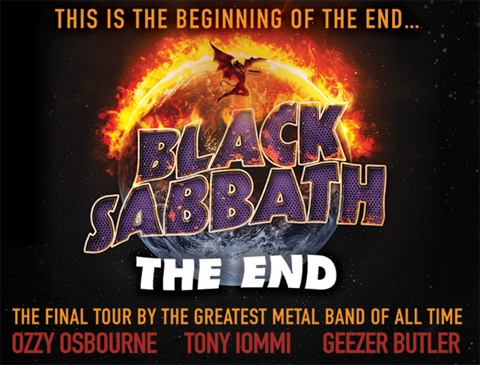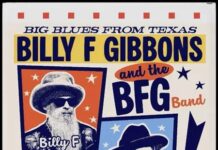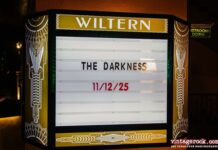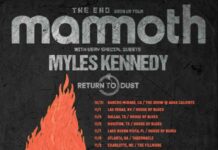Review by Shawn Perry
If this really is “The End” for Black Sabbath, they’re certainly going out the right way with sold-out concerts, a solid opening act, and a full campaign of merchandise and swag to make it a worthy memory. I thought I’d got my Black Sabbath fix three years earlier when they came through the Southland behind their final studio album 13. But then came the announcement of “The End” and the urge to see them one more time, my sixteenth since 1974, churned away at my insides. Plus, I was a fan of the supporting band Rival Sons, who landed the gig at the 2015 Classic Rock Roll of Honours Awards in Los Angeles. Press invites were limited, so I wrangled a ticket in the nosebleeds through a friend of a friend of a friend, and drove over to the Forum for my final goodbyes.
There were a lot of people looking for tickets, a rare occurrence at other shows I’ve been to of late. The bulk of Sabbath’s prized catalog was recorded in the 1970s, yet by all appearances, they are bigger than ever. They could barely sell out Long Beach Arena back in the mid 70s, where I saw them many times. Today, they’ve achieved a ‘vintage’ status — pioneers of heavy metal, a genre that exalts its founders with unfettered reverence and devotion. At the same time, they appeal to a wider audience, part of the hard rock triad that includes Led Zeppelin and Deep Purple. The fact that they paved the way for Judas Priest, Iron Maiden and Metallica is purely incidental.
What surprised me most, walking into the Forum and climbing the stairs to my seat five rows from the venue’s ceiling, was that many of the fans I saw were youngsters, likely a mere twinkle in one’s eye at the time the original Sabbath roamed the world’s stages. They might have even missed Ozzy Osbourne’s ascent to superstardom in the 1980s, Sabbath with other singers, or the reunions with Osbourne in the 1990s and early 2000s. This may be the beginning of the end of Black Sabbath, but for many at the Forum, this was the first and last time.
As happy as I was that Rival Sons were on the bill, I had concerns about the pairing. Would the Long Beach band’s temporal broth of psychedelic bluesy hard rock soothe the hardcore masses assembled for Sabbath? Here, in their own hometown, the reception was light and polite, and the set came off a bit soft in what I was expecting to be a more hard-hitting support role. They pulled out the plums like ‘Electric Man” and “Open My Eyes” from their 2014 album, Great Western Valkyrie, and drifted into sublime blues interludes that narrowly registered with the incoming spectators.
The group was genuinely apprehensive about playing the Forum for the first time, a dream for any LA band, but especially bitter sweet for a band that’s spent years refining their craft and becoming more popular in Europe than the States, let alone in their home state of California. Singer Jay Buchanan, assuming a more Jim Morrison look than I’d seen before, expressed his gratefulness to Black Sabbath for the opportunity and talked about living and working in Los Angeles. “It means a lot,” he said. After they finished up with “Keep On Swingin’,” I could see the band had finally stepped up their game and the audience was responding. If only they’d had more than the 40-minute allotment. Still, I could sense a general appreciation for Rival Sons even as a mad scramble for the bathroom and beer — in that order — got underway as the set finished up. The life of an opening band isn’t always so glamorous. Fortunately, Rival Sons got loose at a show of their own the next night in Orange County.
I changed seats for a better view just as the curtain fell. Red flashing lights, sirens and the heat of six burning torches enveloped the room as singer Ozzy Osbourne, guitarist Tony Iommi and bassist Geezer Butler stepped forward and asserted their might. “What is this? That stands before me?” Osbourne asked in a forlorn, almost demonic tone, and the audience shivered in anticipation. If this was really “The End,” the band had to go back to the beginning when their assault was raw, unforgiving, sincere and new. Tonight, in fact, would focus primarily on the first three albums — Black Sabbath, Paranoid and Master Of Reality — recently reissued in tandem with the tour and generally regarded as the foundation on which the band grew, expanded and pretty much set the tone and weight for what became known as heavy metal.
Despite a rich and varied reservoir of songs to choose from, there were few surprises in the setlist. Lots of tracks from the band’s self-titled debut and Paranoid were trotted out. Clearly, that’s what the people wanted to hear because the response was there. I felt somewhat alone in my appreciation for “After Forever,” a song with a Christian theme from Master Of Reality they played. It’s an undervalued riff that packs as much of a wallop as “Children Of The Grave,” which they finished up the main set with.
“Snowblind” is undoubtedly one of the key numbers from Vol. 4, but I’d been a whole lot happier hearing “Tomorrow’s Dream” or “Supernaut.” This left no time for anything from Sabbath Bloody Sabbath or Sabotage, although “Dirty Women” from Technical Ecstasy keeps getting thrown into the mix. Yeah, there were definitely some gaps in songs choices. They didn’t even do anything from 13, their most recent and final studio album that also happens to be their only Number One. Rather strange when you consider they were advertising an eight-song The End EP with live versions of songs from 13 on the big screen before the lights went down.
Speaking of time, at this point it must be accepted that drummer Tommy Clufetos has grown into his role as Black Sabbath’s final drummer. I have to admit I was hoping that Bill Ward would walk out and jump behind the kit for a number or two, but as far I could tell, no one else was counting on it and it clearly wasn’t in the cards. It’s more likely to happen at the Hollywood Bowl when the band returns for their final LA appearance, but who knows if even matters anymore. The drama behind Black Sabbath’s internal squabbles has become obsequious at best. Nevertheless, Clufetos muscled his way through each and every turn and twist, much of it in homage to Ward at his prime, without ever coming up for air.
Osbourne, Iommi and Butler kept on pace, and rarely faltered in playing out their respective parts. Everyone knows Ozzy hits bad notes, sings in weird keys, occasionally falls flat, but that and his quips about seeing everyone’s “fucking” hands are the cornerstones of his violon d’Ingres. He still is, and will always, be, for better or worse, the voice of Black Sabbath. When he’s on, like he was for “Fairies Wear Boots” or the encore of “Paranoid,” a song he’s probably sang 10,000 times, there’s no mistake that his voice belongs to these songs. Even Ronnie James Dio couldn’t take “Paranoid” to new heights.
As for Tony Iommi, any doubts about his abilities on the guitar were diminished the minute he spat out a lead on “Into The Void.” And even though there more desirable songs from the latter 70s era the band could have mined over the aforementioned “Dirty Women,” that song did provide a suitable palette for Iommi to go deeper, showing that despite his battle with cancer (currently in remission), he still knows his way around a fretboard. His speed, dexterity and tone are as emblematic as ever.
Butler was a bit more restrained than I had seen him in previous years, likely due to age and road weariness. Still, his agility as a player is as easily taken for granted as it is praised. That may be because the bass is so tightly embedded into Black Sabbath’s sound, it’s often difficult to distinguish where the guitar begins and the bass ends. Both Butler and Clufetos’ solo spots clenched the thirst for bottom-end enthusiasts, and served as bookends at certain spots in the set. Sixteen songs and an hour and half later, they all were taking their bows in front of a screen, proclaiming “Black Sabbath The End.” I want to believe that they really mean it, but you know how these things go. Whether it’s “The End” for them, or me, or anyone else, is often a matter of premature folly.





















